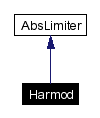
#include <Harmod.hpp>
Inheritance diagram for Harmod:


Purpose: The Harmod is more diffusive and less accurate than other limiters, but it converge best.
We can call it a general purpose limiter.
Harmod(a,b)= (sign(a) + sign(b))/2 * min(|a|, |b|)
Harmod(a,b)= 0 if ab <= 0
a if ab > 0 && |a| <= |b|
b if ab > 0 && |a| > |b|
Limiters are widely used in discrete differential computation to provide more
accurate results than central differential.
We know that central differential scheme oscillate around solutions. Limiters are tools
helping to avoid this problem. Example of applications are ENO and WENO schemes, ...
Another reason of Harmod usage in restoration, is the need of building fast intra-grid data, like
have point differentials:
k[i+1/2,j]= average(k[i+1,j]+k[i,j])
The central schemes are averaging neigbour grid values.
k[i+1/2,j]= (k[i+1,j]+k[i,j])/2
Limiters like the Harmod,... can replace it.
k[i+1/2,j]= Harmod(k[i+1,j]+k[i,j])
Paper: "Afternotes on PHM: Weighted Harmonic ENO Methods.",
Antonio Marquina, Spain, 2003.
"Experiments in minimizing numerical diffusion across a material boundary.",
Christian Aalburg, Thesis, Aerospace engineering, University of Michigan 1996.
"Euler's Elastica and curvature based inpaintings.", T. Chan, S.Kang, Report UCLA 2000.
"Regularized Shock Filters and Complex Diffusion.", Guy Gilboa, N. Sochen & Y Zeevi, Report Technion, Haifa, Israel 2003.
New central schemes with Harmod:
"New High-Resolution Semi-discrete Central Schemes for Hamilton-Jacobi Equations.",
Alexander Kurganov & Eitan Tadmor, Journal of Computational Physics 160, p720-742, 2000.
"Central Runge-Kutta Schemes for Conservation Laws.",
L. Pareschi, G.Puppo, G.Russo, UniversitÓ di Ferrara, Italy, 2002.
@ Copyrights: Bernard De Cuyper & Eddy Fraiha 2003, Eggs & Pictures. MIT/Open BSD copyright model.
Public Methods | |
| virtual | ~Harmod () |
| virtual double | average (double a, double b) |
 |
